This decade included Olympics in Moscow, LA and Seoul as our 'greatest moments' series continues to mark the 80th anniversary of AW
Wells wins
The Moscow Olympics of 1980 were affected by the boycotts of a number of nations due to Russia’s invasion of Afghanistan. With the USA absent, Cuba’s Silvio Leonard was favourite for men’s 100m but Britain’s Allan Wells won his quarter-final in a British record of 10.11.
In the final, curiously Wells was drawn in lane one, with Leonard in lane eight and there was little between the two contenders, with the former’s dip giving him victory by inches as both were given a time of 10.25. The Scot narrowly missed out on gold in the 200m final, losing to Pietro Mennea of Italy by 0.02 with a British record of 20.21.
Wells had to put up with suggestions that his win had been devalued by the US boycott but, less than two weeks after Moscow, he took on a field that included the best American sprinters of the day in Germany and won in a time of 10.19.
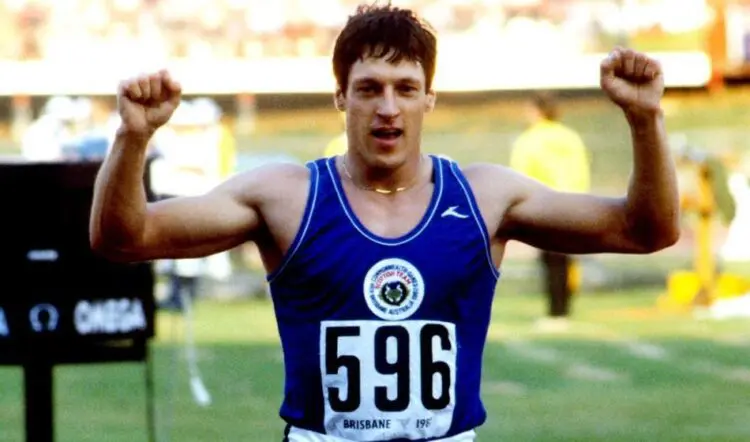
Hand in hand in London
Chris Brasher's visit to the New York Marathon in 1979 sowed the seed for bringing a similar event to Britain. The 1956 Olympic steeplechase champion wasted little time in launching the London marathon, with plans made for a first edition in 1981 with the help of £40,000 sponsorship from Gillette and also from the Greater London Council.
Brasher anticipated 3000 or 4000 runners in the first year but there were 21,872 applications and 7,700 were accepted. The day of March 29 was chosen.
The event taking place was significant in itself but the finish of the men’s race was made all the more memorable when American Dick Beardsley and Norwegian Inge Simonsen made a late decision to run in together rather than sprint it out, holding hands as they crossed the line in 2:11:48, a minute up on Trevor Wright's 2:12:53.
Joyce Smith ran a British record 2:29:57 to win the women's race by nine minutes from New Zealander Gillian Drake.
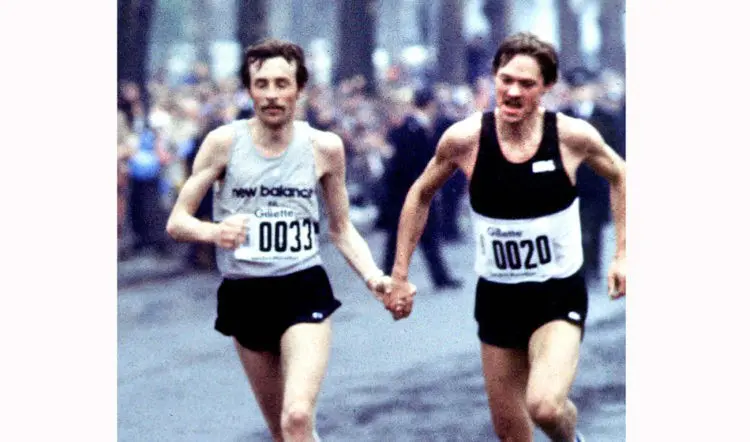
World Championships has lift-off
In 1983, Helsinki provided the staged for the first ever IAAF World Championships.
A total of 1355 athletes from 153 countries competed, with Carl Lewis of the USA winning three gold medals (100m, long jump and 4x100m), Steve Cram taking the 1500m to become Britain’s first gold medallist and Finland’s Tiina Lillak winning a dramatic javelin competition in front of her home crowd. Grete Waitz won the first women’s marathon to be contested at a global championships.
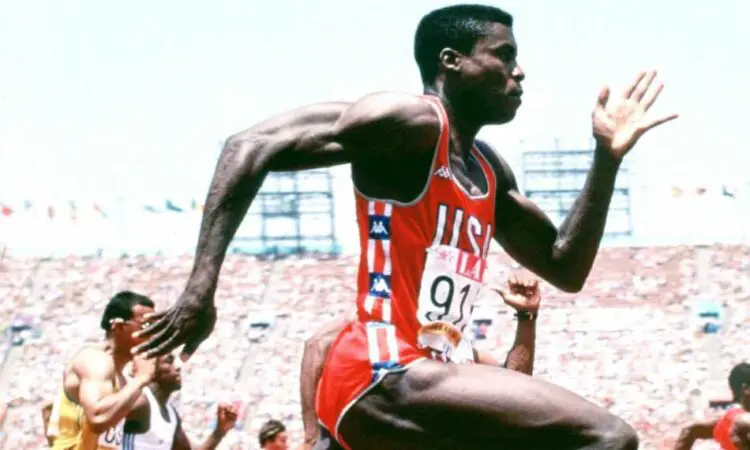
Coe does it again
Just as in Moscow four years previously, Seb Coe toed the line of the Olympic 1500m final looking to bounce back from finishing second in the 800m.
In LA he had been beaten by Joaquim Cruz but had still produced a string of top quality times (1:45.71, 1:46.75, 1:45.51 and 1:43.64) on successive days.
Coe, who had been selected for the 1500m despite a loss in the trials to Peter Elliott, had received plenty of criticism from the press and had a point to prove. Prove it he did, with a performance of 3:32.53 that smashed the Olympic record.
After a cautious first lap, Steve Scott took the lead at 500m and powered through 800m in 1:56.81 with Coe just behind in second. The American faded, though, and Spaniard Jose Abascal led at the bell from Coe who was followed by Steves Cram and Ovett – though the latter, who had finished last in the 800m, had chest pains and dropped out 350m from the finish.
With 200m to go, just as Cram made a move, Coe responded and kicked clear on the bend before accelerating in the straight. His last lap of 53.25 helped him take over two seconds off Kip Keino’s 16-year-old Olympic record of 3:34.91. Cram was a clear second in 3:33.40.
Coe remains the only man to have successfully defended the Olympic 1500m title.
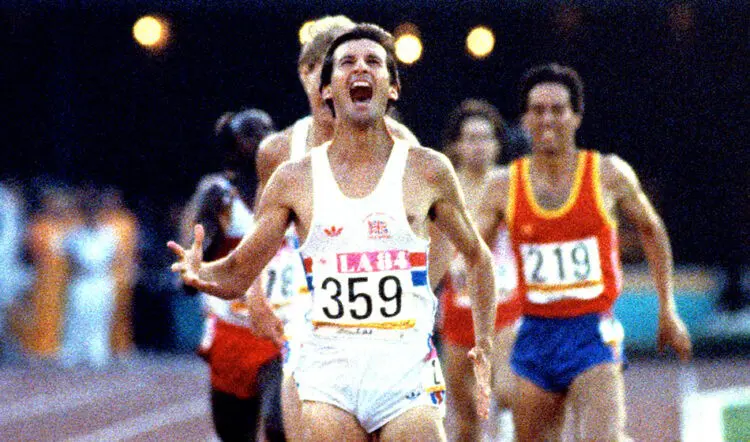
Thompson on top
Daley Thompson could be a controversial figure but his athletic excellence was on full show in the decathlon at the 1984 Olympics. Heading into LA he was the Commonwealth, European, world and Olympic champion, had been unbeaten in competition for six years and broken the world record twice since his victory in Moscow. His mark, however, had twice been overtaken by West Germany’s Jürgen Hingsen.
It was all the fuel he needed and the man who topped an AW poll last year to find Britain’s Greatest Olympian led from start to finish. With gold all but secured before the final event, the 1500m, it had appeared that, by easing off, he had missed out on the world record by a single point.
Upon examination of the photo finish cameras, however, it was found that Thompson should have been given one more point in the 110m hurdles and had therefore equalled his rival’s 8798. After the introduction of new scoring tables, Thompson’s score was recalculated to 8847, putting him out in front as world record-holder on his own until Dan O’Brien of American scored 8891 in 1992.
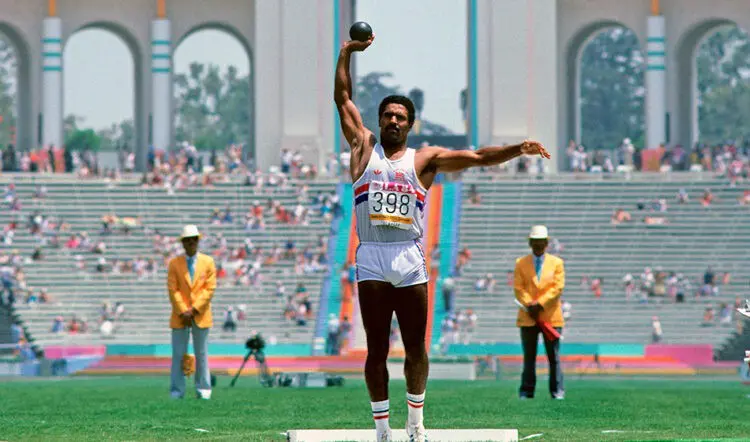
Lewis to the four
Amid all of the star-spangled glamour in Los Angeles, the USA needed a star name to get behind on the athletics track and Carl Lewis was determined to be it. He had been forthright about his ambition to emulate Jesse Owens by winning 100, 200, long jump and 4x100m gold.
Despite a poor start, he was a clear winner of the 100m in 9.99, with team-mate Sam Graddy second in 10.19 and Canada’s Ben Johnson third in 10.22. The long jump was next and Lewis all but secured victory with his first jump of 8.54m. He produced a foul with his only other effort, winning by 30cm from Australia’s Gary Honey and being mindful of a sore hamstring given the workload he still had left.
Bad leg or not, he won the 200m two days later in an Olympic record of 19.80 into a headwind of -0.9. He was followed by USA team-mates Kirk Baptise (19.96) and Thomas Jefferson (20.26).
The final piece of the jigsaw was put in place when Lewis anchored the US team to relay success, enjoying a five-metre lead at the handover and running a split of 8.4 to hit the line in a world record of 37.83 – the only track and field world record of the 1984 Games.
Benoit leads the way
To become the first ever women’s Olympic marathon champion Joan Benoit had to do it the hard way. She had secured her place despite having undergone knee surgery 17 days before the trials and, come race day in Los Angeles, had to contend with a field that contained world champion Grete Waitz, 5000m world record-holder Ingrid Kristiansen European champion Rosa Mota, the Portuguese winner of the European marathon title in the heat of Athens in 1982.
The American raised eyebrows when she decided to up the pace and hit the front at mile three but it was a lead she would not relinquish and crossed the line in 2:24:52 – with Waitz 1:26 behind and Mota taking bronze.
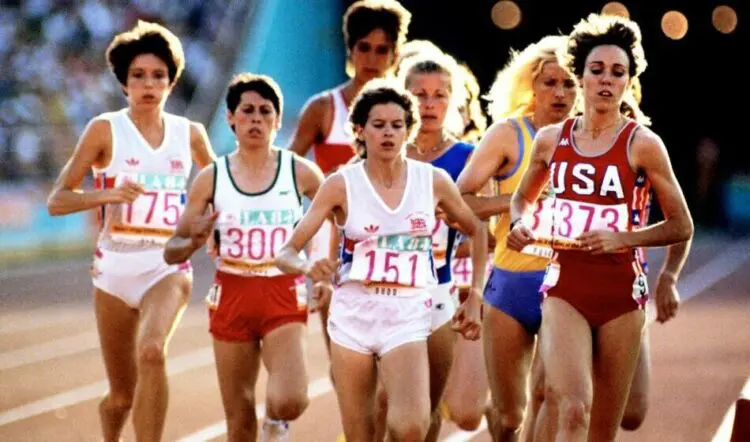
Decker goes down
Mary Decker's tangle with Zola Budd in the Olympic 3000m final at the 1984 Los Angeles Games is one of the most controversial moments in sporting history and is still debated today.
America’s reigning world champion was pitted against a barefoot teenage prodigy from South Africa who had been swiftly given a British passport on the eve of the Games, but Decker ended up on the in-field after tripping and Budd was booed home in seventh place as Maricica Puica of Romania took gold from Britain’s Wendy Sly.
In AW’s report from LA, Mel Watman wrote: “My heart went out to Mary as she lay twisting in agony, even though it was her refusal to back down that led to the disaster. She had made an error, born perhaps of her own relative lack of experience running in tightly packed fields. However, when the booing started, my sympathies transferred to Zola, running with tears in her eyes amid a wave of public antagonism.”
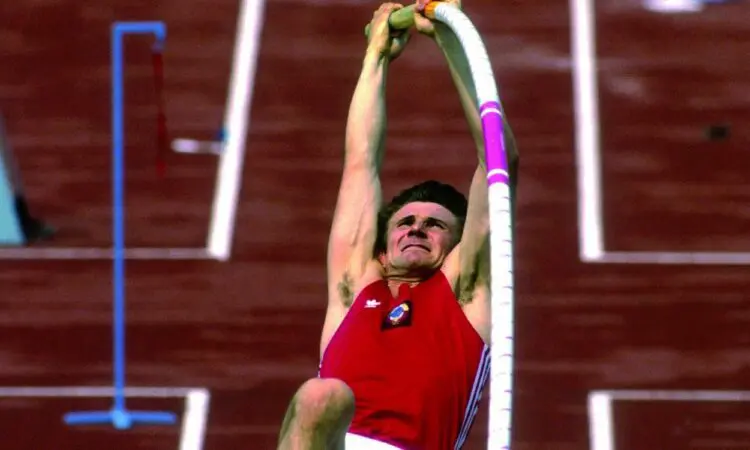
Bubka achieves the “impossible”
Mondo Duplantis might now make it look routine, but clearing six metres in the pole vault was once thought to be impossible.
Sergey Bubka was the first to do it in Paris 40 years ago when the then 22-year-old soared to new heights and broke his previous mark of 5.94m. Despite grazing the bar with his chest it did not fall and the Ukrainian, who was competing for the Soviet Union at the time, secured his fifth world record.
The 1983 world champion won five more world titles, as well as Olympic gold in 1988. In total, he broke 35 world records and, at the time of writing, Bubka has been joined by just 28 other athletes in clearing six metres.
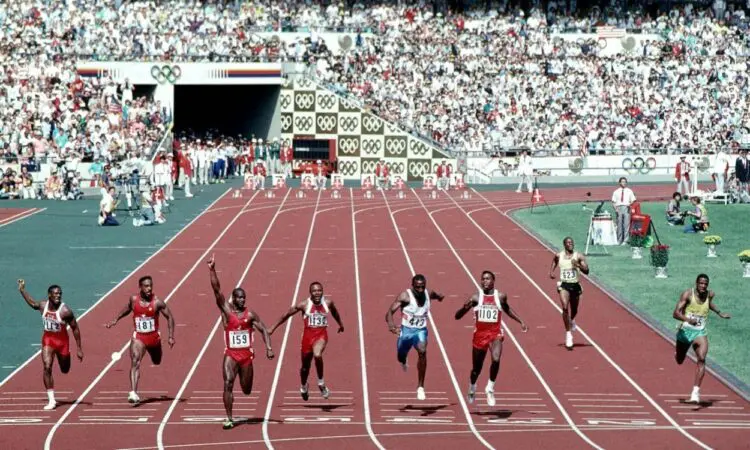
“The dirtiest race in history”
One of the most remembered and infamous moments in the history of athletics centred around the men’s Olympic 100m final of 1988, which has become known as “the dirtiest race in history”.
At the 1987 World Championships, the exceptionally fast-starting Ben Johnson had stunned Olympic champion Carl Lewis to win in a world record 9.83. Johnson had injuries early in 1988 and, come Games time, Lewis was faster in all three qualifying rounds. He was the firm favourite for the final.
Johnson got a perfect start, however, and could not be caught, staring across at Lewis with his right arm thrust into the sky as the clock flashed up a world record of 9.79. Lewis ran his fastest ever time of 9.92 but looked devastated.
It soon emerged that Johnson, adamant that a drink had been tampered with, had tested positive for steroids. The Canadian would later admit that he had taken drugs throughout his career though still insisted he had been framed in Seoul.
He was disqualified, lost that 1987 world title and world record. Lewis’s 9.92 was eventually regarded as the world record.
“[It] was a good day for athletics,” wrote the then AW editor Keith Nelson, “and don’t let anyone tell you otherwise. Yes, the whole world was stunned by the news about Ben Johnson. No, I don’t want to believe it. But it is true. He was a cheat and he has been caught. This is the first significant case victory for the anti-drugs campaigners. The IOC has stood firm and kicked out the ‘winner’ of the most spectacular sprint race in history.”
Flo-Jo on fire
With her flamboyant fingernails and searing sprinting speed, Florence Griffith Joyner – or "Flo-Jo" – was a standout performer at the 1988 Olympics. However, she is another figure who courts controversy and was forced to deny allegations of drug use following her record-breaking performances.
It was at the US trials of that summer when she clocked 10.49, a mark that still stands as the women’s 100m world record but has been the subject of much debate as to whether or not it was achieved thanks to an illegal tailwind.
In Seoul, she broke the Olympic record twice and won 100m gold in a wind-aided 10.54.
She then broke the world record twice on the way to 200m gold, clocking 21.34 in the final – another time that has yet to be bettered. A third gold followed in the 4x100m, while she was also part of the team that won silver in the 4x400m.
Just 10 years later, Griffith Joyner died at the age of 38 following an epileptic seizure.
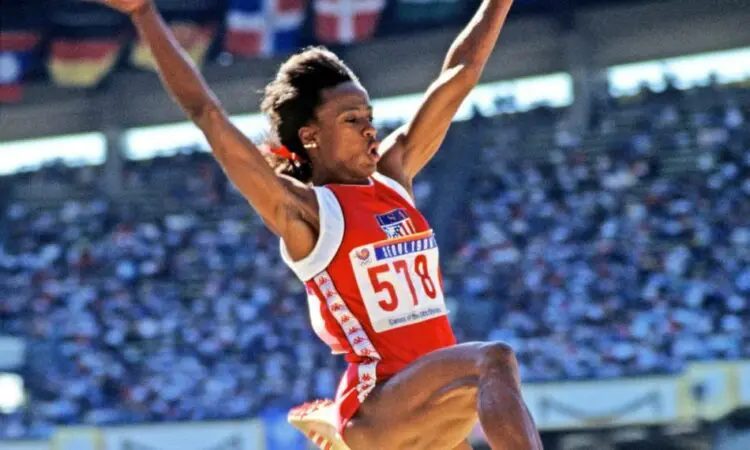
Jubilant Joyner-Kersee
Jackie Joyner-Kersee was another American who finished top of the podium in Seoul but had the spectre of drug-taking allegations (she always denied any wrongdoing) hanging over them. She is the ultimate female all-rounder, and her world record of 7291 points set in winning heptathlon gold in 1988 is a mark that still stands, despite the best efforts of athletes such as Anna Hall. Joyner-Kersee, who married her coach Bobby Kersee, also won Olympic long jump gold in Seoul with an Olympic record of 7.40m.
Did you know?
Between 1977 and 1987, USA’s Ed Moses won 107 consecutive 400m hurdles finals (122 consecutive races) and set the world record in the event four times. He was Olympic champion in 1976 and 1984.
In February 1985, a run of 3:54.57 made John Walker the first person to run 100 sub four-minute miles
